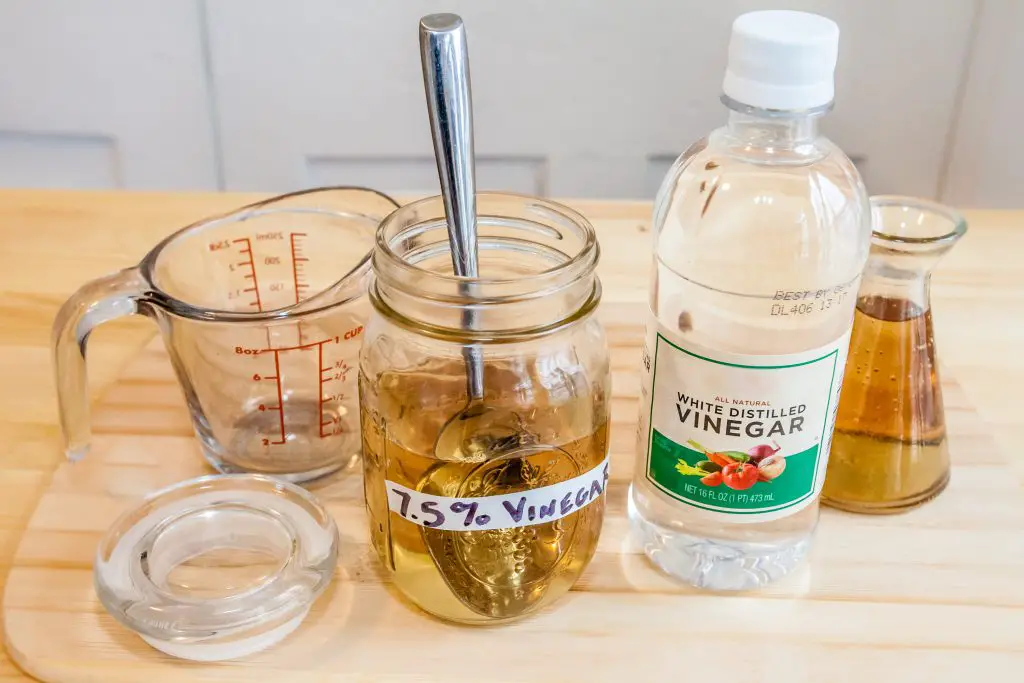In culinary applications, vinegar is often employed as a crucial ingredient to impart acidity, brightness, and complexity to a dish. However, there can be instances where the vinegar’s flavor becomes overpowering, thereby overshadowing the subtleties of other ingredients and making the dish less palatable. This overemphasis on sourness may result from various factors, including the type of vinegar used, its concentration, and the cooking technique applied. Given vinegar’s dominant flavor profile, even a small excess can significantly alter a dish’s overall taste. Therefore, understanding how to mitigate the overwhelming taste of vinegar in food is essential for both amateur cooks and professional chefs alike. Numerous strategies can be employed to balance or neutralize the vinegar’s acidity, ensuring that it complements rather than overwhelms the dish’s intended flavor profile.
Vinegar is a product of the fermentation of ethanol by acetic acid bacteria. Ethanol itself is often produced through the fermentation of sugars by yeast. The basic process involves two primary stages: alcoholic fermentation followed by acetic acid fermentation. Different types of vinegar are made from varying source materials, each contributing to the final product’s unique flavor, aroma, and nutritional profile.
Alcoholic Fermentation:
In this initial phase, yeasts convert fermentable sugars present in fruits, grains, or other organic materials into alcohol (ethanol) and carbon dioxide. For example, apple cider vinegar starts with alcoholic fermentation of crushed apples, while wine vinegar starts with fermented grapes.
Acetic Acid Fermentation:
After the alcoholic fermentation is complete, the ethanol is then exposed to acetic acid bacteria, commonly of the genus Acetobacter. These bacteria oxidize the ethanol into acetic acid, which gives vinegar its characteristic sour taste and pungent smell.
Types of Vinegar and Source Materials:
- White Vinegar: Made from the fermentation of distilled grain alcohol.
- Apple Cider Vinegar: Produced from fermented apple cider.
- Wine Vinegar: Originates from fermented grape wine, either red or white.
- Balsamic Vinegar: Crafted from the reduction of cooked grape juice, which is then fermented and aged.
- Malt Vinegar: Produced from the fermentation of malted barley.
- Rice Vinegar: Derived from the fermentation of rice or rice wine.
- Coconut Vinegar: Produced from the sap of the coconut tree or from coconut water.
- Cane Vinegar: Originates from sugar cane juice that undergoes both alcoholic and subsequent acetic acid fermentation.
Each type of vinegar possesses distinct characteristics based on its source material, the specific strains of yeast and bacteria used, and the method and duration of fermentation. Consequently, vinegars can vary widely in flavor, acidity, and potential culinary applications. Understanding the origins and production methods of different types of vinegar can aid both amateur cooks and professional chefs in choosing the right vinegar to complement specific dishes and achieve desired culinary outcomes.
Vinegar Nutrition Facts and Health Benefits
Vinegar is a fermented liquid primarily composed of acetic acid and water, alongside various trace compounds, vitamins, and minerals. Its nutritional content and health benefits have been the subject of multiple scientific studies. Here’s an in-depth look into the nutrition facts and health benefits of vinegar:
Nutritional Facts:
- Caloric Content: Vinegar is low in calories, with most varieties containing fewer than 20 calories per 100 grams.
- Acetic Acid: The primary active component, accounting for its characteristic taste and potential health benefits.
- Vitamins and Minerals: Vinegar contains small amounts of potassium and some B vitamins but is not a significant source of nutrients.
- Phenolic Compounds: These are antioxidants found in varying levels depending on the type of vinegar, and they contribute to several health benefits.
Health Benefits:
- Blood Sugar Regulation: Acetic acid has been shown to improve insulin sensitivity and lower blood sugar spikes after meals, which can be beneficial for individuals with type 2 diabetes or those at risk.
- Weight Management: Some studies suggest that vinegar can help increase feelings of fullness, thereby reducing overall caloric intake. However, this claim requires further substantiation through more extensive research.
- Antimicrobial Properties: Vinegar has been used as a natural preservative and disinfectant due to its ability to inhibit the growth of certain bacteria and fungi.
- Cholesterol Levels: Preliminary animal studies have indicated that vinegar might reduce lipid levels, although evidence in humans remains inconclusive.
- Digestive Health: Vinegar, especially apple cider vinegar, is often cited for its role in improving gut health by promoting the growth of healthy bacteria.
- Skin Health: The anti-inflammatory and antibacterial properties of vinegar have been suggested to benefit skin health, although direct application should be done cautiously to prevent skin irritation.
- Antioxidant Activity: The phenolic compounds in vinegar act as antioxidants, neutralizing free radicals in the body, thus potentially reducing oxidative stress and associated health risks.
It’s essential to note that while vinegar has several purported health benefits, excessive consumption can lead to adverse effects such as tooth enamel erosion and gastrointestinal discomfort. Therefore, moderation and consultation with healthcare providers are advisable, especially for individuals with pre-existing health conditions. Moreover, vinegar is not a substitute for a balanced diet and should be consumed as part of a diversified nutritional regimen.
How to reduce vinegar taste in food?
Reducing the overpowering taste of vinegar in a dish requires a multi-pronged approach that may involve culinary techniques, ingredient modification, and careful balance of flavors. Here are some academic suggestions to mitigate an excessive vinegar flavor:

- Dilution: The simplest method is to dilute the dish with water, broth, or other cooking liquids. This will disperse the concentration of vinegar, thereby lowering its impact on the overall flavor profile.
- Addition of Fats: Fats have a neutralizing effect on acidity. Adding butter, oil, or cream can counterbalance the strong taste of vinegar.
- Sugar or Sweeteners: Sweetness can counteract the sourness of vinegar. Adding sugar, honey, or a sweet fruit can help achieve a balanced flavor. However, one must exercise caution to prevent the dish from becoming overly sweet.
- Starchy Foods: Ingredients like pasta, rice, and potatoes can absorb some of the excess vinegar, thereby diluting its impact.
- Additional Ingredients: Incorporating more of the other components of the dish, whether they are vegetables, proteins, or grains, can also serve to dilute the vinegar’s flavor.
- Balancing with Other Acids: Using milder acids like lemon juice or a less concentrated vinegar can also help. However, this should be done carefully to avoid exacerbating the issue.
- Cooking Time: Some types of vinegar may lose their potency when exposed to prolonged heat. Simmering the dish for an extended period could potentially tone down the vinegar’s taste, although this is often ingredient-dependent.
- Spices and Herbs: Aromatic spices such as cloves, cinnamon, or herbs like basil and oregano can mask the overpowering taste of vinegar to some extent.
- Taste Adjustment: Continuous taste testing during cooking can help to prevent the problem of too much vinegar initially. This enables adjustments to be made in real-time during the preparation process.
Each of these techniques has its own set of ramifications concerning the texture, taste, and nutritional content of the dish, requiring a nuanced understanding of food science and culinary arts to execute effectively. Therefore, the method or combination of methods to be used largely depends on the specific type of dish being prepared and the characteristics of the other ingredients involved.
FAQs:
Q: Why does my dish taste too much like vinegar?
A: An excessive vinegar taste can be attributed to a variety of factors such as the type of vinegar used, its concentration, and the interaction with other ingredients in the dish. Overestimation of the quantity needed or a failure to balance its acidity with other flavors could lead to an overpowering vinegar taste.
Q: Can I remove vinegar from a dish after it has been added?
A: Once vinegar has been added to a dish, it becomes challenging to remove it entirely. However, you can dilute its taste by adding more water, broth, or other base ingredients to the dish. Alternatively, you could employ techniques like adding fats or sugars to neutralize its acidity.
Q: Does cooking reduce the vinegar taste?
A: Some types of vinegar may lose some of their potency when exposed to heat for an extended period. Prolonged simmering might reduce the vinegar’s dominant flavor, but this varies depending on the specific ingredients involved in the dish.
Q: Can sugar effectively neutralize vinegar?
A: Sugar or sweeteners can counteract the sourness of vinegar to some extent. However, care must be taken not to add too much sugar, as this could unbalance the dish in the opposite direction, making it overly sweet.
Q: Is there a specific type of vinegar that is less overpowering?
A: Milder vinegars like rice vinegar or apple cider vinegar tend to have a less aggressive flavor profile compared to stronger vinegars like white vinegar or balsamic vinegar. Using a milder vinegar can help in maintaining a balanced flavor.
Q: Can I use other acids instead of vinegar to balance the dish?
A: Yes, alternative acids like lemon juice or citric acid can also provide the acidic balance without the strong flavor associated with vinegar. Again, these should be used judiciously to avoid throwing off the overall flavor balance.
Q: Do spices and herbs help in reducing vinegar’s overpowering taste?
A: Spices like cloves, cinnamon, and herbs like basil or oregano can contribute aromatic complexity that may distract from or complement an overpowering vinegar taste. However, they are unlikely to neutralize the acidity.

James Burney is the founder of Acadia House Provisions is a restaurant that with local & upscale dishes and high-quality kitchen supplies and food products. James was born and raised in Maine, and he has always been passionate about cooking. After working in a number of prestigious restaurants he started Acadiahouseprovisions.com with the goal develop into a comprehensive information site specializing in cooking and cuisine. His goal is to make it easy for people to cook delicious meals at home without spending a fortune.

